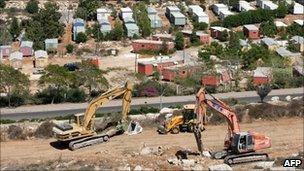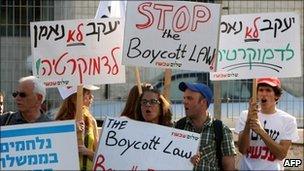Israeli lawmakers pass West Bank settlement boycott law
- Published

The West Bank settlement of Ariel was the focus of a boycott by Israeli artists and academics
The Israeli parliament has passed a controversial law that will punish any Israeli individual or organisation boycotting West Bank settlements.
Rights groups say the legislation stifles freedom of speech and compromises Israeli democracy.
After failed attempts to delay debate, it was voted through 47-36.
It follows several Israeli calls to boycott institutions or individuals linked to Jewish settlements on occupied Palestinian land.
The settlements are deemed illegal under international law, although Israel disputes this. Recent peace talks with the Palestinians were derailed over the issue of continued building in settlements.
The Palestinians want the West Bank as part of a future state.
Among the recent initiatives that angered settlers and their influential political patrons was a pledge by Israeli academics and artists to boycott the West Bank settlement of Ariel.
Israeli developers also agreed not to use products or services from settlements when they signed on to help build a new modern Palestinian city, north of Ramallah.
Under the new law those who sponsor a "geographically based boycott" - which includes any part of the Jewish state or its settlements - could be sued for damages in a civil court by the party injured in the boycott call.
The petitioner is not required to prove that "economic, cultural or academic damage" was caused, only that it could reasonably be expected from the move.
"The State of Israel has for years been dealing with boycotts from Arab nations, but now we are talking about a homegrown boycott," said the author of the legislation, lawmaker, Zeev Elvin, the Associated Press news agency reported.
"It is time to put an end to this travesty. If the State of Israel does not protect itself, we will have no moral right to ask our allies for protection from such boycotts."
Fierce opposition
The new law has been strongly opposed by rights groups in Israel.

Israeli left-wing activists have campaigned against the bill
The Association for Civil Rights in Israel (Acri) described it as "deeply anti-democratic" and a violation of Israelis' freedom of speech.
"There is no question that promoting boycotts is a legitimate, democratic, non-violent form of protest that is being used by Israelis on a wide variety of issues from environmental issues to opposing the prices of certain products," said ACRI executive director, Hagai el-Ad.
"No reasoning has been suggested to explain why the boycott of settlement goods should be uniquely cherished as opposed to the right of the Israeli citizen to protest."
On Sunday, activists opposed to the boycott ban held a noisy demonstration outside the Justice Ministry. They carried banners which read "the boycott law boycotts democracy."
There are plans to challenge the legislation in Israel's High Court.
The Palestinian Authority (PA) has led an increasingly concerted campaign against the settlements.
Last year, it passed a law banning settlement produce from Palestinian shops in the West Bank. Traders who break the law face prison and a heavy fine.
However the PA has yet to pass promised legislation making it illegal for Palestinian labourers to work in settlements.